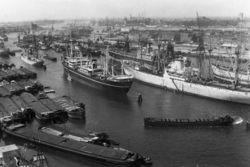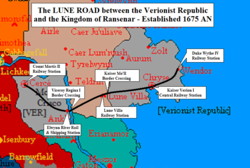Verionist Republic: Difference between revisions
Kingdomcoria (talk | contribs) No edit summary |
|||
| Line 25: | Line 25: | ||
|area = 51,748 km2 | |area = 51,748 km2 | ||
|arearank = N/A | |arearank = N/A | ||
|pop = | |pop = 43,287,000 | ||
|activepop = | |activepop = | ||
|poprank = N/A | |poprank = N/A | ||
Revision as of 00:58, 21 August 2019
| Verionist Republic | |||
| |||
| Motto: "Patientia Vincit Omnia" | |||
| Anthem: March of the Guardians of the Star | |||
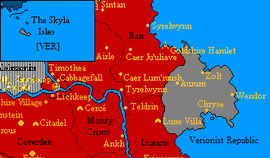
| |||
| Map versions | |||
| Capital | Chryste | ||
| Largest city | Zolt, Cerce, Wendor, Skyla | ||
| Official language(s) | Istvanistani, minority Praeta | ||
| Official religion(s) | None official, majority Cedrism | ||
| Demonym | Verionist (Republican) | ||
| Adjective | Verionist (Republican) | ||
| Government | Verionist Centralised Republic, Plutocracy | ||
| • Kaiseress | Kaiseress Salome (purely ceremonial title) | ||
| • Viceroy | Regina Verion | ||
| • {{{headoflegislature2title}}} | {{{headoflegislature2}}} | ||
| Legislature | Council of Seven | ||
| Establishment | 1672 | ||
| Area | 51,748 km2 | ||
| Population | 43,287,000 | ||
| Currency | New Erb (v€) | ||
| Abbreviation | VER | ||
| Driving side | |||
| Time zone(s) | CMT-7 | ||
| National animal | Moose | ||
| National drink | Treesian Red | ||
The Verionist Republic is an independent nation on Benacia. The Republicconsists of three non-contiguous parts: the High Earldom of Elsenar, the High County of Monty Crisco and the High County of the Skyla Isles, over which it has effective territorial control. The Verionist Republic was established following the Kalirion Fracture in the year 1672 AN. After initially claiming to be the only lawful successor of the Imperial Republic of Shireroth, the Verionist Republic entered an agreement with the Imperial Regency following which the independence of the Republic was recognised internationally. The official ideology of the state is Verionism. The Government of the Republic is Plutocratic, handing power to a small group of people alligned with the House of Verion, the Iron Company and the Verionist political movement.
Outline
For detailed information on the various cities of the nation, see: Cities of the Verionist Republic
The Verionist Republic consists of three non-contiguous parts: the High Earldom of Elsenar, the High County of Monty Crisco and the High County of the Skyla Isles. The Verionist Republic has a long coastline, wich is highly advantageous for international trade.
Elsenar
The High Earldom of Elsenar is the largest part of the Verionist Republic. It has been part of the Imperial Republic of Shireroth since its conception. Elsenar has, throughout its history, been a centre of commercial activity and economic growth. The cities of Elsenar were among the richest of the Imperial Republic, due to its location. The ports of Elsenar were not only used for international trade, but also as entrepots to store the Gold from the mines of Aurum. In the 15th century, Duke Wythe of Goldshire made the ports of Wendor and Zolt an academic centre, and alongside those activities the ports themselves provide testament to Elsenar's mercantile origins. The Golden Trio of Zolt, Wendor and Chryse on the Shire Sea, and the River Elwynn port of Tyrelwynn in neighbouring Ran provide an important trading hub between Northwestern Apollonia and the Benacian interior. Despite Musica's influence further south, Elsenar remains a preferred route of shipping for goods of a slow moving but valuable nature - and is host to a series of small shipping companies who provide exclusive and discreet services to noble customers who, for whatever reason, do not wish to trade by mainstream methods.
After the Peace of Fieldburg in 1669, Elsenar became one of the territories governed by the Iron Company, and its importance for the mercantile routes in Shireroth was once again stressed. Following the Kalirion Fracture, the Iron Company exercised authority over Elsenar, and expanded its borders Westward to include the highly profitable Goldshirithian Mines around Aurum. In 1671, the High Earldom became part of the Verionist Republic.
Monty Crisco
The High County of Monty Crisco is located on the West Bank of the River Elwynn, and stretches from the outskirts of Shirekeep all the way to the Guttuli Protectorate in the South. Monty Crisco has played a special role in the Imperial Republic of Shireroth, being the home County of many Kaisers from the House of Metzler.
The history of Monty Crisco is deceptively understated, having begun as a contentious conquered region during the First Era, a source of pretenders during the Second Era, and a source of various political intrigues during the early Third Era. Even so, it has succeeded at remaining outside of the crosshairs during military conflicts and has suffered mostly through bad karma.
During the First Era, the region was settled by an indigenous population related to those found in western Goldshire. One of the region's leaders was Krzyszko, who swore fealty to Kaiser Raynor I, and used the Imperial favor to purge the region of rivals and founded the House of Krzyszko. His grandson rebelled under Kaiser Brrapa II, but swore fealty to the usurping Kaiser Nicholas I, who was of a member of a cadet branch of the Line of Metzler. A Count Cryszco V married his daughter to the a member of the senior branch of the Line of Metzler, who then used the Crisco powerbase to propel him to the throne as Brrapa III, restoring the Line of Metzler to power. This event, and Brrapa III's inability to produce a viable heir, threw the realm into chaos, ending the First Era. During the Second Era, the Line of Metzler continued to rule as Counts of Mount Crysco, using it to seize the throne four times: Kaiser Brrapa IV in 1011, Kaiser Iago I in 1269, Kaiser Iago II in 1279, and Kaiser John II in 1375 through an alliance with daemons. Following John II's overthrow, possession of Monty Crisco passed to Kaiser Erik II and the Line of Ly'Technomaezj-Metzler, who had overthrown him. During the Third Era, the county was involved in a series of inter-comital alliances, though remained economically backward in the relation to other parts of Brookshire, which were industrializing. From the rule of Kaiseress Anandja I until the rise of the Necrarchs, the the County of Monty Crisco had been in a constant state of rebellion, especially under Kaiser Aurangzeb. The County was brought under heel by the reigns of Mira Raynora Major and Minor, then utterly ravaged by the Cabbage Crisis, destroying much of the economy. Since then, it has been partially resettled under the watchful eye of the Imperial Capital. The economy of Monty Crisco remains primarily agroindustrial, taking advantage of new automated techniques and a radical restructuring of the old, fractured tenant plots into large plantations.
In the early 1670s, Monty Crisco became home to the Revolutionary Army of Crisco, a syndicalist pseudo-state, who fought against both the Imperial Regency and the Kingdom of Ransenar. Following the Treaty of Lune Villa, a peace was established. Following ratification, the Verionist Republic moved swiftly and annexed the Crisco Free State in Operation Monty.
The culture of Monty Crisco can be simply described as melancholic. Despite being the seat of many kaisers from the Line of Metzler and later of Ly'Technomaezj-Metzler, Criscans have rarely been in nor sought the spotlight. Its ancient alliance with Alexandretta and the subsequent dissolution of that alliance has helped to form the modern Criscan mentality. According to stories, the Count of Monty Crisco and the Baroness/Countess of Alexandretta became impassioned lovers; however, the love affair came to a tragic and heart wrenching end. It is said that the count of the time was so distraught that he spiraled into a deep depression, and as a result the county as a whole suffered. This story may also explain the high prevalence of depression within the county's population, tied with its recurrent economic troubles. The county's state forests regularly patrol for suicides.
The Skyla Isles
The High County of the Skyla Isles consists of three islands off the coast of Lichbrook, currently in the Guttuli Protectorate. From the north, the Isle of Aroth, Isle of Myn and Isle of Skyla.
The Skyla Isles held a special role in the Imperial Republic of Shireroth for being the summer residence of the Kaiser. Most famous landmarks on the Isles are the several buildings which serve as residences of the Imperial Family. The Summer Residence (consisting of several palaces) is just one - but the largest and most impressive - of the possessions of the Golden Mango Throne. The Skyla Islands also house a large number of ancient Cedrist and Boomist temples. The Kaltorian Palace in the centre of Skyla is the residence of the Count
After his assumption of the Kaisership, Titus Morvayne, now as Kaiser Verion II, moved to the Skyla Isles. The situation in Shirekeep was no longer sustainable for the Morvayne supporters, and Skyla was chosen for its historic and symbolic significance. The Imperial Summer Residence hosted a duplicate of the Golden Mango Throne, which Verion II assumed. Today, the relic is converted to the Imperial Throne of the Kaiseress of the Republic, and as such remains empty. A smaller chair, placed in front of the Throne is used by the Viceroy in the stead of the Kaiser.
History
Following the downfall of the Shirithian nation, and the power vacuüm that was left after the death of Kaiser Ayreon IV, the city of Shirekeep remained under the tight control of its Prefect, Titus Morvayne, deeming the time ripe for increasing his power, Morvayne had himself elected Kaiser by the Landsraad. Although the City Guard, as well as the Apollonian Guard, supported his claim, he was unable to convince the leadership of the Palatini Corps. This saw Shirekeep being thrown into disarray, with the Imperial Forces located in the Keep containing the Verionists who controlled the largest part of the city. Within the year that followed, Kaiser Verion's supporters left the city. Verion himself moved to the Skyla Islands together with the largest group of his supporters, where he continued his claim on the Imperial Mango Throne.
The Verionist Republic claimed to be the official successor state of the Imperial Republic of Shireroth, but holding effective territorial control only over the Skyla Islands. The nation was established following the Kalirion Fracture which lead to the break up of the Shirithian state. In the chaotic period that followed, the former Prefect of Shirekeep, Titus Morvayne, ascended to the Imperial Throne as Kaiser Verion II, in a contested Landsraad election. Verion II left Shirekeep after a stand-off with Shirekeep Garrison loyal to the designated Kaiseress Salome. The Verionist supporters left for the Skyla Islands, former summer residence of the Kaisers, where they established the Imperial Verionist Republic. Although initially met with opposition from the Regency, the Verionists showed their pragmatic side and brokered a deal that saw their sovereignty over Greater Elsenar, Skyla and later Crisco recognised. Following the return of Titus Morvayne to Shirekeep, and his renunciation of the Mango throne, the Verionist Republic threw its support behind Kaiseress Salome.
Government
The Government of the Imperial Verionist Republic closely mirrors the old Shirithian system of intrinsic neo-feudalism. In line with Verionist principles, however, the country is highly centralised and much of the effective power is vested in a small group of people. The Republic has a strong and powerful executive, consisting of the Kaiser, the Viceroy and the Council of Seven. The large majority of laws is brought forward by these institutions, through means of Decrees and Council Decisions.
Executive
The nominal head of state of the Imperial Verionist Republic is the Kaiser. This title however is nothing but a courtesy, and purely ceremonial. Contrary to the custom in Shireroth, the Kaiser does not appoint a formal successor. The Council of Seven decides upon the position of Kaiser, and may dismiss a Kaiser at any time.
Incumbent Kaiser is Salome, she was designated as the Head of State following the renunciation of the throne by Titus Morvayne, previously Kaiser Verion II. He who was elected by the Shirithian Landsraad in Shirekeep. The election, being held at midnight, was however contested by factions loyal to the designated heir Salome, and the Regent. Following the treaty with the Imperial Regency, the Kaiser is only a ceremonial head of the nation, and does not hold any effective power.
The executive power of the nation remains with the Viceroy. The Viceroy is the de facto autocratic ruler of the Republic, and rules by decree. Some executive tasks are delegated to te respective competent members of the Council of Seven, who each have their own specific portfolio and duties. The Kaiser also serves as Commander-in-Chief of the Imperial Forces, a task which is shared by the Lady Commander of the Armed Forces who sits on the Council of Seven. The Viceroy rules "in stead of" the Kaiseress, but in fact has the sole authority in the nation.
Regina Verion serves as first Viceroy, having previously served as Chancellor of the Iron Company dominion of Elsenar. Aside from having the Viceroy, the Verion family has significant power in the nation, all members of the direct Verion line hold the dignitary title of "Prince(ss) of the Republic". Due to the relation between the family, the Iron Company merchants and the state, the Verionist Republic is often classified as a Plutocracy.
Council of Seven
The Council of Seven is the formal legislature of the Imperial Verionist Republic and is an assembly of the High Nobles of Shireroth, as appointed by the Kaiser. The Council of Seven also serves as an advisory body to the Viceroy. The Viceroy may delegate her tasks to the respective members of the Council, who each have their own specific portfolio and duties. The current composition of the Council of Seven is a balance between Verionists, and Iron Company-allied members, and the old nobility of Elsenar.
Conclave of the People
The Conclave of the People is an elected, unicameral assembly in the Republic. It may be described as a Parliament, but its role is purely advisory. The Conclave may adopt Recommendations, which then will be discussed by the Council of Seven. The Conclave of the People is elected by the citizens of the republic, every citizen above the age of 21 is allowed one vote. The Verionist Republic has universal suffrage, but every citizen has be be previously registered as an elector in order to be allowed to vote. The elections, although for an advisory body, are contested by different fractions, movements and parties. The Conclave of the People is a way for the citizens to make their concerns heard, and as such those who are registred as electors take the time and effort to vote. The Conclave of the People has 575 seats, all of which are up for election every 5 AN years. The Verionist Union holds a significant majority in the Conclave.
Composition of the Conclave of the People as per 1675 AN
| Election Symbol | Party | Leader | Ideology | Colour | Seats |
|---|---|---|---|---|---|
| V | Verionist Union | Regina Verion | Verionism | Black |
389 / 575 |
| S | National Syndicalist Front | Carolus Flynt | Socialism, Syndicalism | Red |
45 / 575 |
| E | Elsenari Agrarian League | Miles Milfort | Agrarianism, Conservatism, Ludditism | Green |
36 / 575 |
| U | Democratic Verionist Movement | Gregory Ulric | Verionism, Pro-democracy, Liberalism | Orange |
34 / 575 |
| B | Vanguard for Strength | Barbara Ruwan | Authoritarianism, Militarism | Burgundy |
27 / 575 |
| X | Movement for Imperial Re-Unification | Eric Raznor | Shirithian re-unification, Verionism | Blue |
25 / 575 |
| L | Lunatic Legions | Ainor Ylarim | Lunatic interests, Environmentalism | Yellow |
19 / 575 |
Foreign Relations
The Verionist political movement had a long, and often divisive, history in Shireroth. The hard-line positions of its supporters and political affiliates have left its trace even in the current political climate. The Verionist Republic, as such, has a troubled relationship with most of the other Vulture States.
Lune Villa Conference
In 1675, the Verionist Republic, the Kingdom of Ransenar and the Free State of Crisco gathered in the border city of Lune Villa for a peace conference. Relations between the Ransenari and the Verionist sphere of influence had reached a low point following the opposing sides in the Morvayne conflict in Shirekeep. The Ransenari government had seized assets from the Iron Company, and had placed troops on the border. The Verionist Benacian Army had also been mobilised. This exchange of hostilities occured against the backdrop of Crisco terrorism on the East Bank of the Elwynn river, most notably in Teldrin. The Ransenari government felt threatened by the continued attacks on its city. The three nations met in Lune Villa, in the Rosebud Hotel which is located next to the Kaiser Mo'll Border Crossing between the respective nations, which had remained closed since the independence of Ransenar.
The Conference resulted in a peace between the three countries, and the signing of the Treaty of Lune Villa. It marked the end of the hostilities, and the beginning of a closer cooperation between the Verionist Republic. The Iron Company re-assumed operations in Ransenar following the ratification by the Council of Seven and its promulgation by decree by the Viceroy.
Position towards Benacian nations
Allied:
 Ransenar: Relations with the Kingdom of Ransenar had a rocky start, and tensions almost escalated during 1674 and 1675. A peace conference in Lune Villa was necessary to improve relations, which resulted in the Treaty of Lune Villa, and established a new alliance between the nations, as well as close cooperation on trade and infrastructure.
Ransenar: Relations with the Kingdom of Ransenar had a rocky start, and tensions almost escalated during 1674 and 1675. A peace conference in Lune Villa was necessary to improve relations, which resulted in the Treaty of Lune Villa, and established a new alliance between the nations, as well as close cooperation on trade and infrastructure.
Friendly:
 Batavia: The Verionist Republic supports the Kingdom of Batavia, and has extensive relations throught the Iron Company.
Batavia: The Verionist Republic supports the Kingdom of Batavia, and has extensive relations throught the Iron Company. Elwynn: The Verionist Republic has close ties with the Elwynnese Republic, especially in the North where the Verionist presence is strong. Conducator Stephen Lewis is a strong ally of the Republic and has supported its conception and expansion.
Elwynn: The Verionist Republic has close ties with the Elwynnese Republic, especially in the North where the Verionist presence is strong. Conducator Stephen Lewis is a strong ally of the Republic and has supported its conception and expansion. Kalgachia: Viceroy Regina Verion has once described the secluded mountain state as "The only sensible nation on Benacia".
Kalgachia: Viceroy Regina Verion has once described the secluded mountain state as "The only sensible nation on Benacia". Sanama: Although no formal relations exist, the Verionist government supports Sanama's stabilising presence in the South.
Sanama: Although no formal relations exist, the Verionist government supports Sanama's stabilising presence in the South.
Open for interpretation:
 Shireroth: Relations with Shireroth are ambiguous. The Verionist Republic, as per 1675, supports the reign of Kaiseress Salome. Past tensions however make for a difficult relationship with the Imperial Regency.
Shireroth: Relations with Shireroth are ambiguous. The Verionist Republic, as per 1675, supports the reign of Kaiseress Salome. Past tensions however make for a difficult relationship with the Imperial Regency.
Neutral:
 Amokolia: The Verionist Republic has no relations with Amokolia.
Amokolia: The Verionist Republic has no relations with Amokolia. Guttuli Protectorate: The Verionist Republic has no relations with the Guttuli Protectorate.
Guttuli Protectorate: The Verionist Republic has no relations with the Guttuli Protectorate. Inner Benacia: The Verionist Republic supports the independence of the Republic of Inner Benacia, and does not recognise the caretaker government of the Sovereign Confederation, which it regards as "Raspur imperialism".
Inner Benacia: The Verionist Republic supports the independence of the Republic of Inner Benacia, and does not recognise the caretaker government of the Sovereign Confederation, which it regards as "Raspur imperialism". Tellia: The Verionist Republic has no relations with Tellia.
Tellia: The Verionist Republic has no relations with Tellia. Unified Governorates: Although officially neutral, the influence of Raspur and the competing ESB-group, make that the Unified Governorates of Benacia are looked upon with some distrust.
Unified Governorates: Although officially neutral, the influence of Raspur and the competing ESB-group, make that the Unified Governorates of Benacia are looked upon with some distrust.
Hostile:
 Sovereign Confederation: The Sovereign Confederation was described by the Council of Seven as "an international travesty, the failing personal fiefdom of one of the worst leaders in history, an affront to humanity". The eagerness of the Sovereign Confederation to jump the bandwagon and instigate hostilities against the Verionist Republic make that the state is regarded as one of the main enemies of Verionism. The Verionist Republic also supports irredentist Elwynnese claims over Wintergleam.
Sovereign Confederation: The Sovereign Confederation was described by the Council of Seven as "an international travesty, the failing personal fiefdom of one of the worst leaders in history, an affront to humanity". The eagerness of the Sovereign Confederation to jump the bandwagon and instigate hostilities against the Verionist Republic make that the state is regarded as one of the main enemies of Verionism. The Verionist Republic also supports irredentist Elwynnese claims over Wintergleam. Stormark: Stormark is regarded as the driving force behind the Froyalanese Violation, the Verionists in Shireroth were instrumental in the fight against the Storish insurgency, and played a significant role during the Auspicious Occasion. The Storish are regarded as a main source of evil in Benacia, and can often be heard mentioned in curses.
Stormark: Stormark is regarded as the driving force behind the Froyalanese Violation, the Verionists in Shireroth were instrumental in the fight against the Storish insurgency, and played a significant role during the Auspicious Occasion. The Storish are regarded as a main source of evil in Benacia, and can often be heard mentioned in curses.
National Identity
The national identity of the Verionist Republic is largely rooted in its Shirithian past. Having been a part of Goldshire for most of its existence, the lands of Elsenar retain the Goldshirian culture and certain symbolism. The international character of the great port cities made that they are largely multicultural, and open to change.
The Verionist movement draws upon the Shirithian past of the country, and reinforces the ideas of a strong state, an important role for the nobility, and an appreciaton of Cedrism as the national relgion.
National Symbols
| Star of Verion | 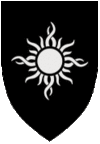
|
The Star of Verion, here displayed on the coat of arms of the House of Verion, is the main symbol of the state. It is depicted on the national flag, in gold on a blue backdrop. The Star of Verion originated in the Elfinshi realms in Northern Elwynn, where the Verion family originates from. It is said that the Elu Verion, ancient ancestor of the House, saw the star in the sky and prayed to it before a battle. The morning after, the star had appeared in white on his, previously, plain black shield. |
| Sword of Chaos | 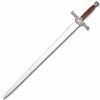
|
The Sword of Chaos is a mythical Great Sword of the Cedrist religion. According to legend, this great sword was forged by the God Loki as a joke upon the Death God, Mors. The exact powers of this sword were unknown to mortal man, but it is said that upon using the sword and seeing its powers, the God of Death actually laughed with such power that his laughter could be heard even in the Mortal Realm. The Sword of Chaos had remained in the caves underneath the city of Zolt. It was discovered by Cedrist priest Oled B'mahah in the early 17th century. However, the dangers surrounding the sword are thus that instead of removing it, a large vault door was built in the cave to prevent anyone entering. Nowadays, the atrium in front of the Cave of the Sword is a site of pilgrimage for devout Cedrists. |
| Finanzia | 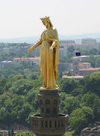
|
Finanzia is the Cedrist goddess of finance, money and trade. She is the most popular goddess of the Cedrist pantheon in the Republic. Statues of Finanzia can be seen all over the country, and she is depicted on national currency. Many citizens of the Republic, mostly merchants and salesmen, wear small golden amulets with her depiction. According to lore, Finanzia was born out of the elements of silver and gold, and she is depicted wearing a long golden cloak. A massive golden statue of Finanzia adorns the Cedrist Temple in Chryste, depicted here with a panorama view of the city, including the University in the background. |
Safety and Security
Corps of Watchmen
The Corps of Watchmen is the police force of the Verionist Republic. No centralised police exists, instead, there are 15 different Corps of Watchmen in the Verionist Republic. Each Corps answers to the Prefect. A Corps of Watchmen may either be an urban force (such as the Watchmen of Chryse), or a general force for a fiefdom (Such as the Watchmen of the Duchy of Aurum).
Military
The Verionist Republic has two main military forces: the Verionist Benacian Army, and the Iron Militia. The VBA is one of the largest military forces in the world, with a standing army of 405.000; and a reserve unit of over 7 million. Military conscription is compulsory. The VBA is almost entirely commanded by former Iron Militia officers, and it operates according a strict chain of command. The Verionist Benacian Army is under command of the Viceroy in her role as Commander-in-Chief. Daily operations and decision-making are delegated to the Lady Commander of the Armed Forces, Lyanna Verion.
The Iron Militia remains seperate from the state, but maintains a sizable force in the Verionist Republic, which is the heartland of the Iron Company. The main role of the militia remains to safeguard the interests of the Company first.
Monty Crisco has its own seperate forces, aside from the Iron Militia. The High County was one of the first counties to develop a militia for itself. "The Corps", as it is known in Monty Crisco, is a militia under the direct command of the count and consists entirely of recruits from inside the county. The Corps is sanctioned by the Council of Seven for internal defense and external actions. Though rarely called to service, the Corps has fought in a few limited engagements outside the county in the past. Usually deployed within the neighboring lands, the Corps once fought at the City of Shirekeep itself defending it against a rebellion. The Corps also had the distinction of precipitating the small conflict between the Kaiser and many noble in the Fall of 2007, when Kaiser Mors V had them deploy in Port Nevermore in the Barony of Lumina's Light for no explainable reason.
Economy
The Iron Company is by far the most important financial factor in the nation, it possesses many assets and controlls trade and economic development to a large extent. As such, the Verionist Republic is deeply connected into the international trading network of the Company, which gives it access to a wide array of markets. The Verionist Republic imports most of its goods from outside Benacia through the Iron Company shipping routes, partly because the land routes would cross hostile Vulture States, and partly because the post-Shirithian economies are characterised by financial recession and dismanteled manufacturing works.
The main export products of the Verionist Republic are gold, from the Aurum mines; timber; stone; pack animals from the plains of Zolt, Vehicles from the Wendor Motors and arms from the GoldenGun conglomerate just outside Chryste. Aside from exports products, the Verionist Republic is a hub of financial and governmental services. Chryste was home to the very first stock exchange of Shireroth, which is still fully functioning.
List of Registered Companies
| Company Name | Products & Services | Company headquarters | Registry date |
|---|---|---|---|
| Bakersfield Ltd. |
|
Zolt | 1672 |
| Central Agriculture |
|
Chryste | 1671 |
| GoldenGun |
|
Chryste | 1674 |
| Iron Company |
|
Chryste | 1671 |
| TransVer |
|
Chryste | 1674 |
| Wendor Motors |
|
Wendor | 1673 |
The currency of the Verionist Republic is the New Erb (v€), the New Erb is backed by the Gold Standard, which is kept in the vaults of Wendor, where the Iron Bank headquarters are located. The New Erb is minted by the Iron Company to which the Verionist Republic has outsourced its monetary policy.
Infrastructure
The Verionist Republic has a decent network of roads, most of them dating from Goldshirian times. The nation has a number of international ports, mainly Chryste, Wendor, Skyla and Zolt. A high-speed railroad connects the cities of Aurum and Chryste, the railroad was built by the Iron Company for the purpose of transporting gold from the backlands to the port of Chryste.
The Republic has four international airports: Kaiser Verion II International Airport in Chryste; Khorze-Holly International Airport in Zolt; Iron Mines International Airport in Aurum; and the Imperial Airport in Skyla. Due to the difficulties experienced by citizens of the Verionist Republic crossing the border with Ransenar, air travel was the only way of connecting Monty Crisco and Elsenar until 1675. It remains an important, and often inexpensive mode of transportation. Both Iron Airways and TransVer offer many flights to the nearby cities of Cerce and Shirekeep, from which further travel may commence. National flights are mostly done by airship, and almost every city of a population larger than 10,000 hosts an airship station.
Lune Road
As part of the Treaty of Lune Villa, the Verionist Republic and the Kingdom of Ransenar started working on the Lune Road project, a high-end highway and rail connection between the cities of Wendor and Cerce, that passes through the territory of Ransenar. The Lune Road further crosses Chryste, Lune Villa and Ankh. The Lune Road became the main way of transportation between the two parts of the Republic, and is a crucial part of the Iron Company trade network.
Stations connected by the Lune Road railroad:
- Duke Wythe IV Railway Station, Wendor
- Kaiser Verion I Central Railway Station, Chryste
- Lune Villa Railway Station, Lune Villa
- Elwynn River Rail & Shipping Station, Ankh
- Count Mortis II Railway Station, Cerce












